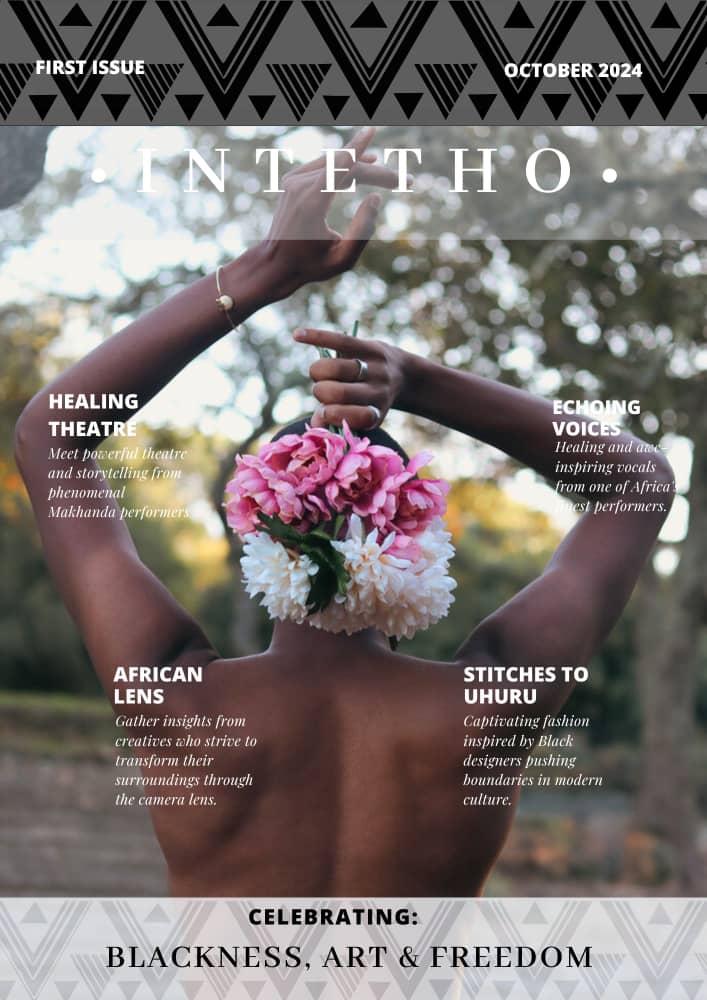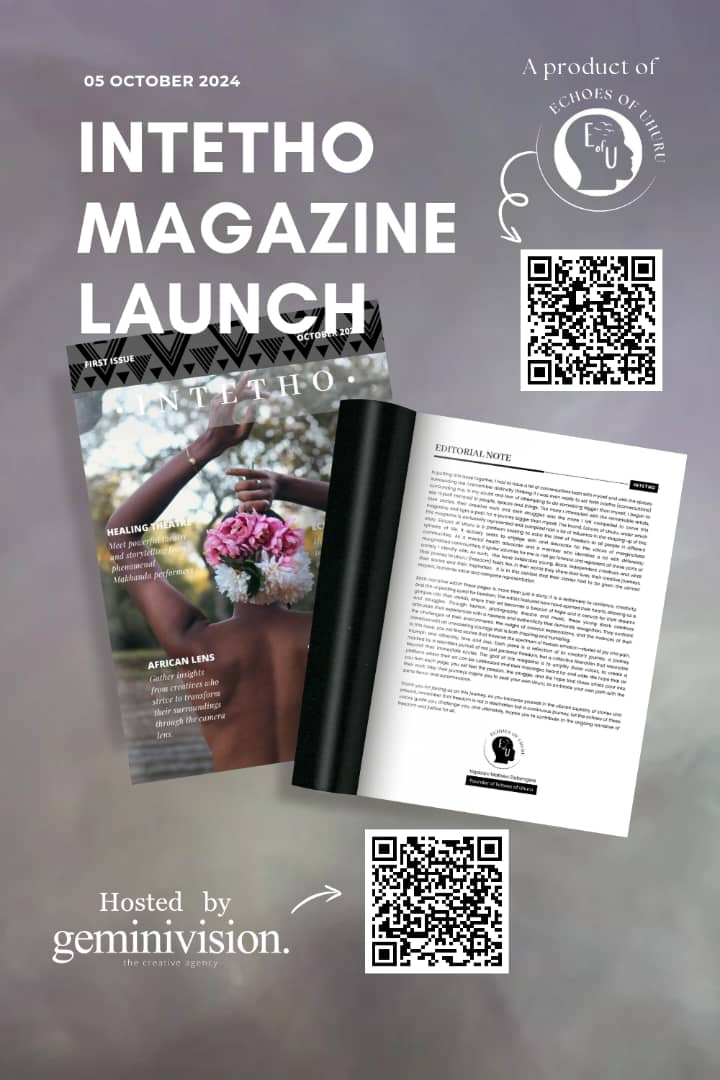
By: Ephreeda Banda
Rhodes University students launched a magazine in October 2024 that goes beyond storytelling to give space, recognition, and respect to those who rarely see themselves represented. Intetho Magazine was created to celebrate often-ignored voices, with a special focus on young Black creatives. It is a project under Echoes of Uhuru, a personal and artistic multimedia initiative started by Nqobani Dabengwa to explore cultural storytelling through collaboration, expression, and radical imagination. Dabengwa is pursuing a Master's degree in Pharmacy Practice.
The name ‘Intetho’ stems from the Xhosa word for ‘conversations’ and reflects Dabengwa’s formative years at Rhodes University. It was inspired by his peers enrolled in the Intetho Zobomi (Discourses of Life) course, which sparked transformative, lunchtime conversations that nurtured community, curiosity, and care. These moments planted the seeds for a platform rooted in dialogue and dignity. Intetho Magazine was born from those moments, and it carries the same energy: a place where honest conversations can happen, rooted in community, truth, and curiosity. The name is a tribute to those transformative experiences and a reminder of what the magazine continues to nurture.
Intetho features in-depth articles, interviews, creative profiles, mental health reflections, and biographical sketches from changemakers. Each issue weaves these contributions into a mosaic of voice and memory, rooted in culture, activism, and lived experience. Many run small businesses, produce handmade or ethically sourced products, and challenge conventional narratives through their craft. Black stories are not an afterthought; they are the foundation.
The first issue was launched at the Geminivision Creative Agency studio, where the magazine was co-dreamed into existence. The event was intimate and energising, filled with genuine support. People bought copies, shared the work, and offered to collaborate. Co-founder Lithemba Nziweni recently showcased his Hairitage series and helped curate the launch and shape Intetho’s visual identity with intention and care. "They weren't just a service provider," Dabengwa said. "They were co-dreamers."
The journey to publication involved cross-border coordination, limited funding, and personal strain, with Dabengwa managing nearly all aspects alone, from design to logistics. These struggles highlighted the importance of improvisation and community support in grassroots publishing. "At the start, I was doing everything by myself," he said. "But I knew the vision was bigger than me." Despite the challenges, the response was uplifting. The magazine's first issue was donated to one of the departments at Rhodes University for educational use. Sabona Arts and Crafts in Bulawayo, long a haven for local artisans and youth-led collectives, welcomed the magazine into its archive. Amazwi South African Museum of Literature, impressed by an article in Grocott’s Mail, requested a copy and initiated a partnership. These placements signal Intetho’s belonging in living archives celebrating African resistance and storytelling.
The magazine has grown from a solo project into a community effort. "We underestimate how hungry people are for platforms that centre Black voices with intention and care," Dabengwa said. "Most people who helped with the launch and promotion are Rhodes University students. It's easier to move forward when your audience is your community." For him, this reflects the broader culture at the University, a space that encourages academic success and personal and creative leadership.
Since November 2024, Intetho has expanded its team. Members bring expertise from disciplines like Law, Economics, Drama, Information Systems, Journalism, Anthropology, and Fine Art. They are based both at Rhodes University and remotely. Each brings a unique perspective and commitment to the project's mission. Current team members include:
Kubechosi Mazizi – Head of Reporting and Creative Admin
Leasha Sanyika – Legal Lead, based in Dubai
Junaid Douglas – Social Media Consultant
Dakalo Phindane – Finance Lead and Fundraising
Yeukai Runyowa – Resident Photographer
Kudzai Mhangwa – Editorial and proofreading support
The team’s structure is fluid, allowing for shared leadership and creativity. While roles are defined, decisions are made collaboratively through open dialogue and interactive feedback. Dabengwa oversees major decisions but ensures co-creation remains central.
Each issue of the magazine follows a clear theme. Topics such as identity, mental health, cultural memory, and grassroots creativity guide the selection of stories and contributors. The aim is to create a magazine that is not just informative, but transformative - a publication that helps readers see themselves and their communities more clearly.
The magazine has been featured in Grocott’s Mail and discussed live on Rhodes Music Radio. Pop-ups with Kwantu Designs and Busi B Johnson showcased how creative distribution can bring community-driven art to life, blending music, storytelling, and conversation. Joining the British Council’s SoCreative 2025 cohort marked a turning point, connecting Intetho to international mentorship, funding opportunities, and a wider Pan-African network of cultural leaders.
Looking ahead, the team plans to publish the second issue, expand distribution, host themed activations, and build a digital archive to capture oral histories. These steps aim to deepen community engagement and preserve intergenerational stories.
At its heart, Intetho Magazine is both a mirror and a bridge. It reflects the lived realities of young Black Southern Africans and connects creators across borders and disciplines. In places like Zimbabwe and South Africa, where barriers to creative expression still exist, Intetho is creating space for radical dreaming and collective care. It's more than a magazine; it is a movement grounded in culture, story, and shared hope for the future.

